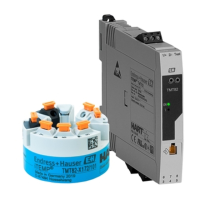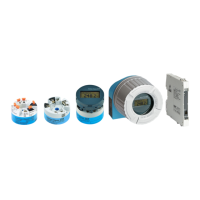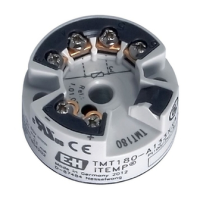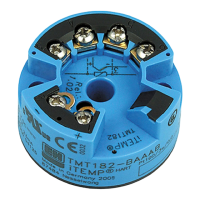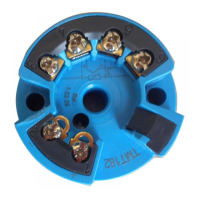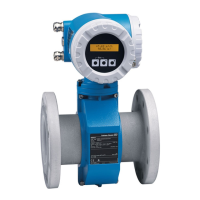Technical data TMT84
48 Endress+Hauser
T = -180°C to -50°C (-292°F to -58°F)
The coefficients A, B and C are used to linearize nickel and copper resistance thermometers
(RTD). The exact values of the coefficients are derived from the calibration data and are specific
to each sensor.
Sensor transmitter matching using one of the above-named methods significantly improves the
temperature measurement accuracy of the entire system. This is due to the fact that to calculate the
temperature measured, the transmitter uses the specific data pertaining to the connected sensor
instead of using the standardized curve data of a sensor.
Non-repeatability As per EN 61298-2
Long-term stability 0.1°C/year ( 0.18°F/year) in reference operating conditions
Influence of ambient tempera-
ture (temperature drift)
Example Pt100: 0.00385 x 100 /K = 0.385 K
Examples for the calculation of the maximum measured error when there is a drift in ambient tem-
perature
Example 1:
Input temperature drift = 10K (18°F), Pt100, measuring range 0 to 100°C (32 to 212°F)
Maximum process temperature: 100°C (212°F)
Measured resistance value: 138.5 (s. IEC 60751) at maximum process temperature
Typical temperature drift in : (0.001% of 138.5 ) * 10 = 0.01385
Physical input measuring range of the sensors Non-repeatability
10 to 400 Cu10, Cu50, Cu100, Pt50, Pt100, Ni100, Ni120 15m
10 to 2000 Pt200, Pt500, Pt1000, Ni1000 100 ppm x measured value
-20 to 100mV Thermocouples type: C, D, E, J, K, L, N, U 4 μV
-5 to 30 mV Thermocouples type: B, R, S, T 3 μV
Effect on the accuracy when the ambient temperature changes by 1K (1.8°F):
Input 10 to 400 0.001% of the measured value, min. 1m
Input 10 to 2000 0.001% of the measured value, min. 10m
Input -20 to 100 mV 0.001% of the measured value, min. 0.2 μV
Input -5 to 30 mV 0.001% of the measured value, min. 0.2 μV
Typical sensitivity of resistance thermometers
Pt: 0.00385 * R
nominal
/K Cu: 0.0043 * R
nominal
/K Ni: 0.00617 * R
nominal
/K
Typical sensitivity of thermocouples
B: 9 V/K at
1000 °C (1832 °F)
C: 18 V/K at
1000 °C (1832 °F)
D: 20 V/K at
1000 °C (1832 °F)
E: 81 V/K at 500
°C (932 °F)
J: 56 V/K at
500 °C (932 °F)
K: 43 V/K at
500 °C (932 °F)
L: 60 V/K at
500 °C (932 °F)
N: 38 V/K at
500 °C (932 °F)
R: 13 V/K at
1000 °C (1832 °F)
S: 11 V/K at
1000 °C (1832 °F)
T: 46 V/K at
100 °C (212 °F)
U: 70 V/K at
500 °C (932 °F)

